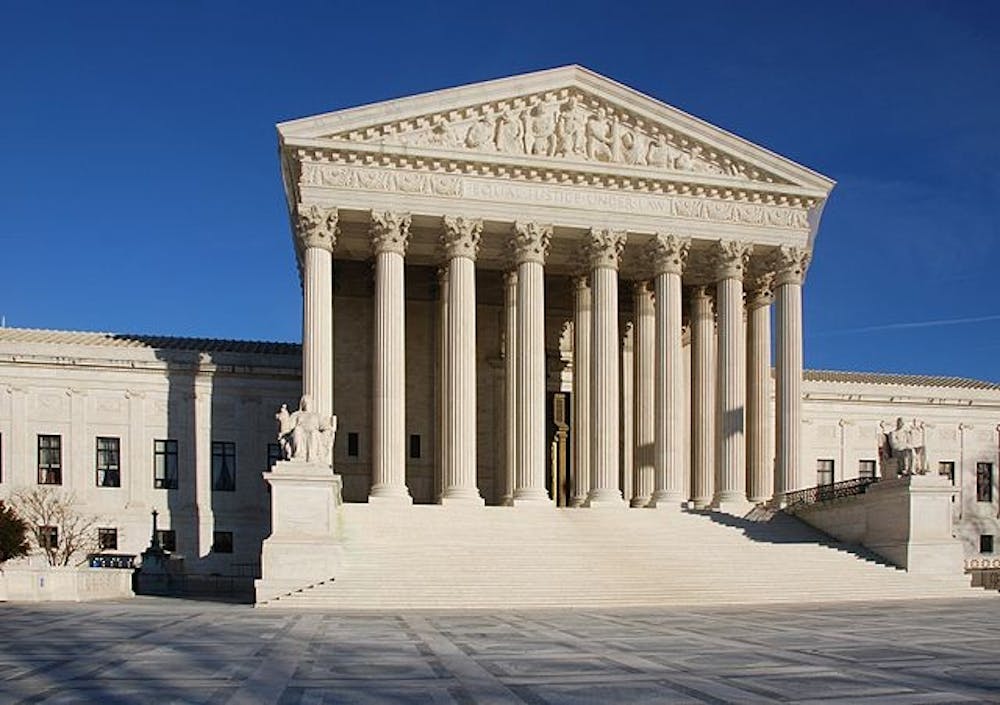Fear and anxiety are two common feelings among University students following the Supreme Court’s decision to overturn Roe v. Wade Friday, a landmark ruling that protected the constitutional right to an abortion for almost 50 years. The decision comes after a draft opinion was leaked in early May.
Rising second-year College student Ffion Button said she saw the news surrounding the leak and understood the potential for the decision, but didn’t realize how quickly it would come.
“I felt my gut drop,” Button said. “I was just very scared and anxious because I realized the gravity of what had happened.”
Button is from Georgia, a state likely to ban abortions at the six-week mark. Thirteen other states in the U.S. have "trigger laws" that went into effect when Roe was overturned, banning abortion.
Abortion is currently still legal in Virginia — in most cases — and there will be no immediate restrictions or changes. However, Virginia Governor Glenn Youngkin has already announced he plans to seek an abortion ban after 15 weeks. Legislation will have to pass through Virginia’s Republican-controlled House and Democratic Senate — Democrats hold only a slim majority in the Senate and all seats will be on the ballot in 2023.
Rising third-year College student Jake Berton reacted similarly, adding the weight of the decision “terrified” him and noting a feeling of helplessness.
“I don't have as much personal stake in this issue, obviously, just being a man, but I think there's something that resonates really deeply and it just terrifies me,” Berton said. “If all the women in this country are being attacked like this, what does that open the doors for?”
Justice Clarence Thomas noted in his concurrence to the decision that he would also “reconsider” the Court’s standings on other unenumerated rights, like the right to contraception as decided in Griswold v. Connecticut or the right to same-sex marriage under Obergefell v. Hodges. Thomas’ opinion contradicts Justice Samuel Alito’s, who wrote that nothing in the opinion “should be understood to cast doubt on precedents that do not concern abortion.”
Just hours after news broke of the decision, University leaders — including President Jim Ryan, Provost Ian Baucom, Chief Operating Officer J.J. Davis and K. Craig Kent, chief executive officer of U.Va. Health — sent a University-wide email clarifying that given Virginia laws, there will be no changes to current services at U.Va. Health.
“While people are obviously free to voice their opinions about this ruling based on their beliefs and experiences, we urge members of our community to do so with empathy and understanding for all,” the statement read.
Student groups at the University were also vocal on social media following the decision, including Planned Parenthood Generation Action at U.Va., University Democrats, Young Democratic Socialists of America at U.Va. and Asian Student Union. As of press time, College Republicans has not responded to requests for comment.
PPGA publicized a number of ways community members can take action following the decision, including donating to local abortion funds or attending a protest or march. In Charlottesville, groups have already begun to rally in protest of the decision.
"For over 50 years, Roe v. Wade had allowed for safe and legal abortion access for people with uteruses, an essential right exercised and enjoyed," the statement read. "Many of us had been expecting this decision for months, and that it has arrived, we feel grief and anger... we will remember that the movement for abortion access and bodily autonomy transcends any historical movement or political circumstance."
Meanwhile, the Executive Board of University Democrats wrote they were “heartbroken” and “infuriated.”
“While voting alone will not dismantle oppressive, patriarchal systems, abortion rights will be on the ballot every November,” the statement reads.
Nikita Amin, communications chair for YDSA and rising fourth-year College student, encouraged students to stay involved with local and state politics and donate if they are able. Amin noted that abortion access will be an important part of YDSA’s platform this fall.
“We strongly condemn the decision that they came to overturn Roe v. Wade, because we see it as an infringement on basic human rights,” Amin said.
Amin also emphasized the intersectionality of the issue, emphasizing the difficulties gender non-conforming individuals will likely face following the decision, as well as how criminalization of abortion will disproportionately affect low-income communities and people of color. Button echoed these concerns, citing experts who say banning abortions will compel individuals to seek out unsafe reproductive care.
“[The decision] will continue to suppress low-income communities, minorities and Black women,” Button said. “It’s not banning abortions. It’s banning safe abortions.”
The Asian Student Union also released a statement underscoring the impact this decision will have on Asian and Asian American communities and encouraged individuals to stand in solidarity with marginalized communities who will be especially affected by the decision.
As members of the University move forward with processing, the University’s Maxine Platzer Lynn’s Women’s Center is also offering a virtual discussion about reproductive justice Monday from 1 to 2 p.m.
Merrill Hart contributed reporting to this story.







